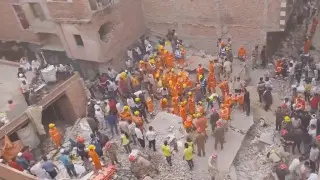
ANI
The Public Examinations (Prevention of Unfair Means) Act, 2024 which aims to prevent malpractices in public examinations and common entrance tests held across the country came into effect on Friday after the massive row erupted over the NEET crisis, UGC-NET junked and then CSIR-NET pushed back on Friday.
A notification about the making the law into effect by the Ministry of Personnel, Public Grievances and Pensions, who announced, "In exercise of the powers conferred by sub-section (2) of section 1 of the Public Examinations (Prevention of Unfair Means) Act, 2024 (1 of 2024), the central government hereby appoints the 21st day of June 2024, as the date on which the provisions of the said Act shall come into force."
The Public Examinations (Prevention of Unfair Means) Act, 2024—the anti-paper leak law for examinations for central recruitment and entrance into central educational institutions—came into effect on Friday, June 21. pic.twitter.com/BapcieFZHa
— All India Radio News (@airnewsalerts) June 22, 2024
It is worth noting the law was passed by the Lok Sabha in February this year, which permits the fine or jail for the individual or organization involved.
NEET (National Eligibility cum Entrance Test)
Crisis: NEET is a highly competitive exam for admission to medical colleges in India. The crisis refers to the malpractices that have been found in the recent exams.
NET (National Eligibility Test)
Junked: The exam was conducted on June 18 and could imply that the exam has been significantly altered. NET is conducted to determine eligibility for college and university-level lectureships and for the award of Junior Research Fellowship (JRF) in Indian universities and colleges.
CSIR-NET (Council of Scientific and Industrial Research - National Eligibility Test)
Pushed back: The CSIR exam has been postponed on Friday. CSIR-NET is a national-level exam conducted for the eligibility of Indian nationals for the Junior Research Fellowship (JRF) and for determining eligibility for appointment as lecturers in certain subjects.
A massive row has erupted after the cancellation of the exams, which can significantly impact the career of the aspirants and the image of the National Testing Agency. The Indian government has recently notified an Anti-Paper Leak Law aimed at curbing exam-related malpractices. This legislation comes in response to increasing instances of exam paper leaks, which undermine the integrity of the education system and disadvantage honest students.
Imprisonment: Offenders involved in leaking examination papers can face stringent jail terms, upto 10 years.
Fines: The law imposes heavy fines, potentially up to Rs 1 crore.
The law targets anyone involved in the unauthorized distribution of exam papers, including students, teachers, and administrative staff. It covers various types of examinations, including academic tests, professional certifications, and entrance exams.
The law emphasizes the need for robust security protocols to protect exam materials. It mandates the use of technology to track and secure the distribution of exam papers.
Special units may be established to investigate paper leak incidents. The law provides authorities with powers to swiftly act against suspected leaks, ensuring timely justice and minimal disruption to the examination process.
Here, it is important to note that the notification of this law comes amid growing public outcry over repeated instances of exam paper leaks, which have eroded trust in the examination system. By enacting this law, the government aims to restore confidence and ensure the sanctity of examinations across the country.
This legislation marks a significant step towards enhancing the integrity and security of examinations in India, aligning with global best practices to safeguard academic and professional standards.













Copyright © 2025 Top Indian News
